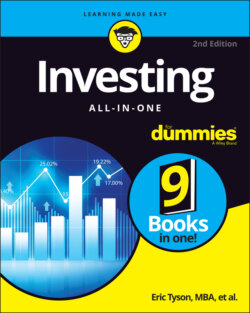Читать книгу Investing All-in-One For Dummies - Eric Tyson - Страница 83
Weighing nontax issues
ОглавлениеAlthough the focus of this chapter is on tax issues to consider when making, managing, and selling your investments, it’s time to raise bigger-picture considerations:
Meeting your goals and preferences: If your life has changed (or if you’ve inherited investments) since the last time you took a good look at your investment portfolio, you may discover that your current holdings no longer make sense for you. To avoid wasting time and money on investments that aren’t good for you, be sure to review your investments at least annually. Don’t make quick decisions about selling. Instead, take your time, and be sure you understand tax and other ramifications before you sell.
Keeping the right portfolio mix: A good reason to sell an investment is to allow yourself to better diversify your portfolio. Suppose that through your job, you’ve accumulated such a sizeable chunk of stock in your employer that this stock now overwhelms the rest of your investments. Or perhaps you’ve simply kept your extra money in a bank account or inherited stock from a dear relative. Conservative investors often keep too much of their money in bank accounts, Treasury bills, and the like. If your situation is like these, it’s time for you to diversify. Sell some of the holdings of which you have too much, and invest the proceeds in some of the solid investments that I recommend in this book. If you think your employer’s stock is going to be a superior investment, holding a big chunk is your gamble. At minimum, review Book 3 to see how to evaluate a particular stock. Be sure to consider the consequences if you’re wrong about your employer’s stock. Develop an overall investment strategy that fits your personal financial situation (see Chapter 3 in Book 2). A problem with holding a large amount of stock in your employer is that both the stock and your job are compromised if the company has a significant downturn.
Deciding which investments are keepers: Often, people are tempted to sell an investment for the wrong reasons. One natural tendency is to want to sell investments that have declined in value. Some people fear a further fall, and they don’t want to be affiliated with a loser, especially when money is involved. Instead, step back, take some deep breaths, and examine the merits of the investment you’re considering selling. If an investment is otherwise still sound per the guidelines discussed in this book, why bail out when prices are down and a sale is going on? What are you going to do with the money? If anything, you should be contemplating buying more of such an investment. Also, don’t make a decision to sell based on your current emotional response, especially to recent news events. If bad news has hit recently, it’s already old news. Don’t base your investment holdings on such transitory events. Use the criteria in this book for finding good investments to evaluate the worthiness of your current holdings. If an investment is fundamentally sound, don’t sell it.
